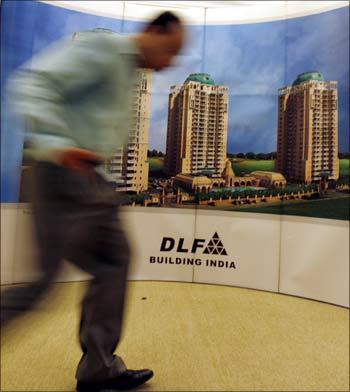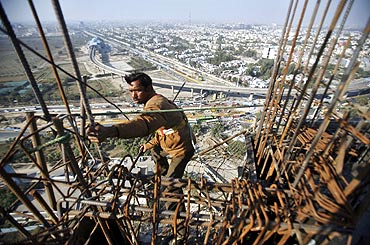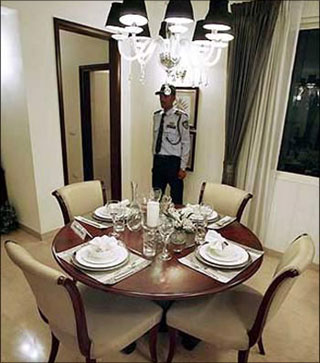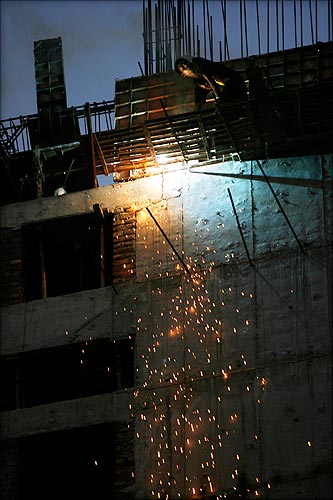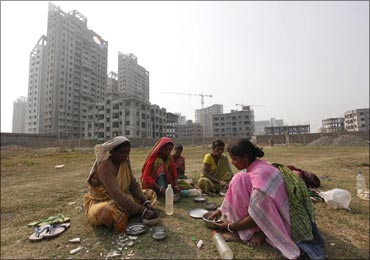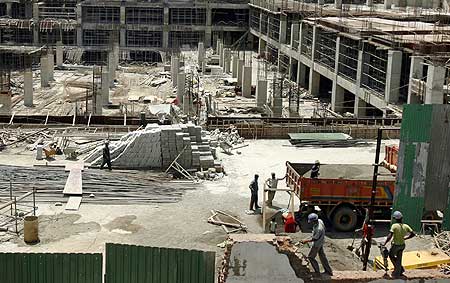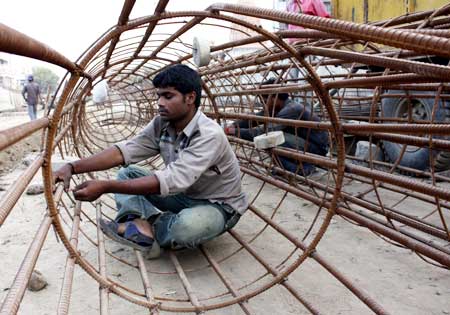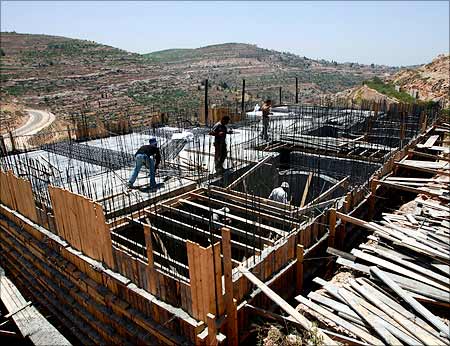 | « Back to article | Print this article |
Fraud alleged: Legal tussle over Sebi probe on DLF intensifies
A complainant has alleged that he was duped of his land worth Rs 34 crore by the DLF Group and following a direction by the Delhi high court, Sebi has ordered a full-fledged probe into the complaint.
Real estate deals in India are fraught with fraudulent practices. These were depicted in an outrageously hilarious manner in a popular Bollywood movie Khosla Ka Ghosla.
While the fictional Khosla was duped of land worth a few hundred thousand rupees, a real-life complainant has alleged that he was duped of his land worth Rs 34 crore (Rs 340 million) by Sudipti Estates Private Limited. The complainant has claimed that Sudipti is an associate company of the DLF (formerly Delhi Land and Finance) Group of companies.
Following a direction by a division bench the Delhi high court, the country's capital market regulator, the Securities and Exchange Board of India (Sebi) ordered a full-fledged probe into the complaint.
This investigation is now being sought to be challenged before a single judge of the same court, who reserved his order on November 23.
Earlier, in July, a bench of the Delhi high court led by its chief justice had ordered Sebi to examine the complaint of a Delhi-based businessman, Kimsuk Krishna Sinha, who claims that he had been duped.
Miffed with the regulator for appearing to bat for the builders, the court had ordered Sebi to investigate the allegations made by the complainant. Thereafter, Sebi's whole-time member Prashant Saran ordered that the allegations be examined 'expeditiously' by an investigating officer.
Click NEXT to read on . . .
Fraud alleged: Legal tussle over Sebi probe on DLF intensifies
Sinha has alleged that Sudipti Estates along with its directors/agents had 'allured' him and 'compelled' him to transfer a part of his land but failed to develop it to generate higher returns as promised.
Further, he claims that he was cheated because the land/property was neither delivered to him nor his money returned. He registered a police complaint in the form of a first information report (FIR) with the Connaught Place police station in the capital, which the DLF Group claimed it was not aware of.
The complainant's charge is that Sudipti duped him by using a maze of intermediary companies while purchasing his land.
The probe by Sebi relates to whether the flagship company in the DLF Group, DLF Limited, had violated 'disclosure and investor protection' rules by not disclosing the police case filed by Sinha as well as the names of all its associate companies while filing its Draft Red Herring Prospectus (DRHP) with Sebi prior to its initial public offering (IPO) of shares.
The allegation levelled against the DLF Group is that it sought to conceal its association with a particular company Sudipti and its agents/directors against which/whom a criminal complaint was pending by divesting this company's shares before the IPO.
These shares were transferred to other companies controlled by the wives of senior executives of DLF.
Click NEXT to read on . . .
Fraud alleged: Legal tussle over Sebi probe on DLF intensifies
Here is a chronological account of what happened.
On May 12, 2006, DLF Limited (earlier known as DLF Universal Ltd) submitted a DHRP to Sebi seeking to raise approximately Rs 9,500 crore (Rs 95 billion) through an IPO of shares.
In October that year, roughly 50 acres of land in Bhandwari village near the Gurgaon-Faridabad road was sold by Kimsuk Krishna Sinha to the DLF Group for a sum of approximately Rs 34 crore though Sudipti, which was at that time a 100 per cent subsidiary of DLF Ltd.
The agreement was that the land would be jointly developed by Sinha and the DLF Group. Of the agreed transaction amount, Sinha claims he paid over Rs 31 crore (Rs 310 million) to Sudipti.
In the May 12, 2006 DRHP filed by DLF, Sudipti was mentioned as an associate company. This document was later withdrawn and a fresh DRHP filed on May 25. This DHRP too was withdrawn and a third modified DHRP was filed by DLF with Sebi on January 2, 2007 -- in the last two versions of the DHRP, Sudipti was not mentioned as an associate company.
The third and final DRHP was processed by Sebi on May 7 that year and disclosed on the website of the regulator of the country's capital markets. The IPO of DLF opened for subscription on June 11 and closed on June 14, 2007.
Click NEXT to read on . . .
Fraud alleged: Legal tussle over Sebi probe on DLF intensifies
[Meanwhile, on April 26, 2007, Sinha had filed an FIR in the Connaught Place police station in Delhi. (The police subsequently filed a closure report which was challenged by Sinha in the Delhi High Court.) After lodging the FIR, Sinha filed a criminal complaint before Metropolitan Magistrate Sudesh Kumar in the Patiala House court in Delhi against DLF, Sudipti and particular executives and officers of the DLF Group, notably Praveen Kumar, managing director, DLF Home Developers Ltd (DHDL), who happens to be the nephew of K P Singh, chairman of the DLF Group.]
On June 4, 2007, Sinha wrote to Sebi informing the regulator about his dispute with Sudipti and the DLF Group.
On June 25, Sebi replied to Sinha saying his letter had been forwarded to Sudipti and DLF for their responses. Sebi also forwarded this complaint to the merchant bankers handling the public issue and they replied that DLF had replied to the complainant denying his allegations.
On July 11, DLF wrote directly to Sinha claiming that DLF had no association with Sudipti on that date. DLF claimed that whereas in 2006 Sudipti was controlled by two of its wholly owned subsidiaries, DHDL and DLF Real Estate Developers Ltd (DREDL), Sudipti was no longer its associate.
On October 29, claiming that Sebi was not acting on his complaint, Sinha filed a writ petition in the Delhi high court against Sebi, Sudipti, DLF and other group companies.
On December 18, Sinha filed an additional affidavit referring to Clause 6.11.1.1 of the Sebi (Disclosure and Investor Protection) Guidelines, 2000, which require disclosure of 'outstanding litigation involving the issuer company'.
Click NEXT to read on . . .
Fraud alleged: Legal tussle over Sebi probe on DLF intensifies
Sinha contended that on the date of the disclosure of the second DHRP, that is, May 25, 2007, an FIR stood registered against Sudipti and alleged that the sale of the entire shareholding of DHDL and DREDL in Sudipti was a 'sham transaction hurriedly executed only to avoid disclosure of the pending litigation involving SEPL (or Sudipti Estates Pvt Ltd) in the prospectus'.
[It transpired that a complex set of transactions allegedly took place on November 29 and November 30, 2006. That day, DHDL and DREDL sold their shares in Sudipti to a company named Shalika Estate Developers (Pvt) Ltd, which too is controlled by DLF through three companies, DHDL, DLF Retail Developers Ltd and DLF Estates Developers Ltd. The last-named three companies transferred 100 per cent of their shares to yet another company, Felicite Builders & Construction (Pvt) Ltd, which in turn was controlled by the wives of a clutch of senior executives of the DLF Group, including Padmaja Sanka, wife of Ramesh Sanka, group chief financial officer, DLF; Madhulika Basak, wife of Surojit Basak, senior vice president, finance; and Niti Saxena, wife of Joy Saxena, another senior vice president, finance.]
On April 9, 2010, Justice S Muralidhar of the Delhi high court directed Sebi to investigate whether or not DLF had failed to disclose material information relating to Sudipti and its dispute with Sinha in its prospectus and submit a report to the court within three months.
In the judge's order, he referred to Sinha's lawyer Amit Sibal (who, incidentally, happens to be Union Minister Kapil Sibal's son) pointing out that the primary business of DLF was real estate development and that the parent company holds 'only 0.5 per cent of its land reserves' of approximately 10,000 acres while the remaining land is 'held indirectly through subsidiaries and other corporate entities over which it exercises de facto control'.
Sebi said it had refused to entertain the complaint filed by Sinha on the ground that it was filed a day before IPO was to close.
The judge, however, turned down Sebi's contention and remarked: "Merely because the public issue was closed, Sebi could not be relieved of its statutory duty to conduct an enquiry into the complaint and into the veracity of the statements made in the Red Herring Prospectus."
Click NEXT to read on . . .
Fraud alleged: Legal tussle over Sebi probe on DLF intensifies
On May 21, Sebi wrote to the company secretary of DLF asking for 'details of association' and financial transactions between April 2006 and May 2010 relating to companies in the DLF Group, including its associates, promoters, directors and key management personnel.
Over and above the companies and individuals already mentioned, Sebi asked for details of the following companies, among others: Vikram Electric & Equipments (P) Ltd, Dominique Builders & Constructions (P) Ltd, Lysandr Builders & Developers (P) Ltd, Mudrock Builders & Developers (P) Ltd, Amandla Builders & Developers (P) Ltd, Eldoris Builders & Developers (P) Ltd and Ishayu Builders & Developers Ltd.
Over a twelve-month period between July 2010 and July 2011, Sudipti, DLF and Sebi filed appeals against Justice Muralidhar's order before a division bench of the Delhi high court comprising the then Chief Justice Dipak Mishra and Justice Sanjiv Khanna.
The case was then argued before the bench. The DLF Group was represented by Soli Sorabjee, former Attorney General of India.
Sebi's counsel Neeraj Malhotra, while challenging the direction of Justice Muralidhar, submitted that relevant documents have been called for and that Sebi would investigate the allegations that have been made.
Advocate Amit Sibal, representing Sinha, contended that if a promoter disassociates itself from a company, then the same has to be disclosed in the DHRP and final prospectus. He also argued that Sebi should have looked into the allegations made by Sinha, since it disclosed illegal conduct.
Click NEXT to read on . . .
Fraud alleged: Legal tussle over Sebi probe on DLF intensifies
On July 21, 2011, the division bench of the Delhi high court ruled against Sebi and the DLF Group in favour of petitioner Sinha and directed Sebi to investigate the allegations made.
The bench rapped the regulatory authority by remarking that Sebi should not be supporting DLF in a private dispute. While delivering the judgment, Justice Mishra observed that as a regulator, Sebi may 'ruffle the feathers' of those involved in half the disputes it had to resolve, but it had no business making a 'frivolous' appeal against an earlier order of a single judge of the court directing the regulator to investigate whether DLF had indeed violated its regulations and guidelines.
The whole-time member of Sebi, Prashant Saran, who examined this case on the direction of Delhi high court, in his order dated October 20, observed: "Having considered the submissions and the fact that the first DRHP (filed on May 12, 2006) was withdrawn and a fresh DRHP was filed in January 2007 after the sale of stake in Sudipti, an examination is required as to whether Sudipti was dissociated for the purpose of avoiding any relevant disclosures that could arise if the entity continued to be part of the DLF Group... Having prima facie observed that the company (DLF) was aware of the FIR registered against Sudipti, it is to be ascertained whether there was a duty on the part of the company to disclose the same in the prospectus."
Interestingly, the company in question, Sudipti, did not make an appearance during the proceedings conducted by the whole-time member of Sebi but gave a written submission.
According to DLF, "the fact that Sudipti was controlled by the spouses of its employees, did not lead to the conclusion that it continues to control Sudipti".
DLF submitted that Sudipti is a separate legal entity, owned and controlled by different individuals, and therefore, the liabilities of Sudipti would not have any bearing on its business.
Click NEXT to read on . . .
Fraud alleged: Legal tussle over Sebi probe on DLF intensifies
Examining the denial of DLF that it was not aware of the FIR registered against Sudipti, Sebi member Prashant Saran noted: "The fact that an FIR was registered against Sudipti is not in dispute... Sudipti did not take a plea that it was not aware of the FIR... in all probability, Sudipti was aware of the FIR registered against it."
On DLF's submission that it was not aware of the FIR, the Sebi member stated that this sounded unconvincing. He noted that the FIR clearly stated that Praveen Kumar, who represented himself as an authorised signatory/director of Sudipti, was related to the promoters of the DLF Group (he is K P Singh's nephew) and was also on the board of many group companies, including DLF Estate Developers Ltd, which according to complainant Sinha was one of the two shareholders of Sudipti.
Sinha had added that Praveen Kumar, Jaiprakash Gaur and Pradeep Singh were among the signatories to the bank account of Sudipti and that the entire transaction (from price negotiation, payment of consideration for purchase of additional land and execution of sale deeds) with which he was involved was done by the three individuals mentioned who held positions of authority and power in many other subsidiaries/associate companies of the DLF Group.
It was also pointed out by Sinha that while in the DRHP filed in May 2006, as many as 357 companies were mentioned as associate companies of DLF Ltd, 336 companies (including Sudipti) ceased to be the associates of the company by the time it filed its fresh DRHP on January 2, 2007 with Sebi. This was an internal restructuring, DLF claimed, arguing that it had nothing to do with Sinha's complaint.
DLF has argued that Sinha does not have any locus to make a complaint as he is not an investor in DLF, that he did not approach Sebi with 'clean hands', had lodged his complaint belatedly and had mala fide motives to avoid income tax liabilities which had accrued due to short-term gains from the sale of land to Sudipti.
Sinha, however, denied that DLF had sole, irrevocable and exclusive development rights on his land and submitted that the DLF had funded Sudipti, which was its wholly owned subsidiary, to purchase land using back-to-back debenture arrangements and back-to-back development agreements.
Click NEXT to read on . . .
Fraud alleged: Legal tussle over Sebi probe on DLF intensifies
As Sebi member Saran stated in his October order: "In brief, the allegation of the complainant is that the funds for the purchase of lands were provided to Sudipti by the company (DLF) in a circuitous manner, as ... gathered ... from the filings ... made with the Registrar of Companies. His grievance is that the said information (was) not disclosed in the RHP."
On November 20, 2011, DLF challenged the Sebi member's order before Justice Vipin Sanghi of the Delhi high court.
DLF's lawyer, former Attorney General Soli Sorabjee argued that Sebi has passed its order 'erroneously and in blatant non-compliance with the principles of natural justice'.
He claimed that Sebi had relied on 'various extraneous materials' and that its order was 'contrary to the jurisdictional mandate' set in the July 22 order of the division bench of the same court.
DLF's contention was that all parties should have been given a chance by Sebi to present their respective cases simultaneously.
Click NEXT to read on . . .
Fraud alleged: Legal tussle over Sebi probe on DLF intensifies
Sinha's lawyers, Amit Sibal and Priyanka Kalra, refuted the argument that Sebi had gone beyond the scope of the July 22 order of the Delhi high court.
They said that Sebi had powers to examine anybody and investigate into the affairs of any public limited company whose shares are quoted on stock exchanges, that Sebi need not hear all parties to a dispute simultaneously at the investigation stage, and that the Delhi high court had sought to safeguard Sinha's interests because Sebi had not earlier been hearing his case.
Further, they argued that there was no question of violating principles of natural justice as what had been initiated by Sebi was fact-finding, preliminary investigation. Only after the investigating officer of Sebi submitted his report, would the entire board of the regulatory authority come to a conclusion.
Appearing on behalf of Sebi, Additional Solicitor General Parag P. Tripathi said that when a regulatory body passed an administrative order to form a prime facie opinion, there was no need to provide an opportunity to other parties to be heard.
He added that Sebi was still at the state of investigation to make up its mind whether or not there had been any violation of public issue norms. If any incriminating material was found, all parties would be given an opportunity to present their cases, he said.
On November 23, Justice Sanghi reserved his order.
